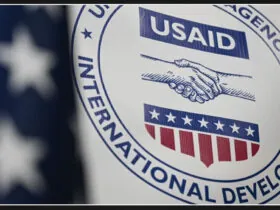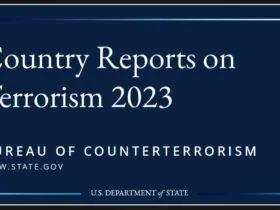A federal judge ruled Sunday that Iowa can continue to challenge the validity of hundreds of alleged noncitizen ballots, despite criticism that the move jeopardizes the voting rights of newly naturalized citizens.
U.S. District Judge Stephen Locher, a Biden appointee, ruled in favor of the state in a lawsuit filed by the American Civil Liberties Union in Des Moines, Iowa, on behalf of the League of Latin American Citizens of Iowa and four newly naturalized citizens. The four were on the state’s list of problematic registrations that will be contested by local election officials.
The state’s Republican attorney general and secretary of state said that reviewing and perhaps removing 2,000 names from the list would stop noncitizens from voting illegally. Despite the fact that voting by noncitizen immigrants is infrequent, GOP politicians across the country have made it a prominent election-year talking point. Their attention has turned to former President Donald Trump’s baseless claims that his opponents are already committing fraud to impede his return to the White House.
In his decision on Sunday, Locher cited a four-day-old Supreme Court decision that permitted Virginia to resume a similar purging of its voter registration rolls despite the fact that it affected some US citizens. He also noted the Supreme Court’s recent rejection to hear a Pennsylvania Supreme Court ruling on state election regulations governing provisional ballots. These Supreme Court judgments instruct subordinate courts to “act with great caution before awarding last-minute injunctive relief,” he added.
Locher also stated that the state’s effort does not remove anyone from the voter registers but rather requires some people to cast provisional ballots.
Iowa Republican Gov. Kim Reynolds praised the verdict in a statement released on Sunday.
“Today’s ruling is a victory for election integrity,” Reynolds stated. “In Iowa, while we encourage all citizens to vote, we will enforce the law and ensure those votes aren’t cancelled out by the illegal vote of a non-citizen.”
According to Rita Bettis Austen, legal director of the American Civil Liberties Union of Iowa, the verdict and Secretary of State Paul Pate’s directive may result in some voters being disenfranchised.
“We are obviously disappointed with the court’s decision not to outright block Secretary Pate’s directive, which we still fear threatens to disenfranchise eligible voters simply because they are people who became citizens in the past several years,” Austen told reporters in a prepared statement. “Even the Secretary agrees that the vast majority of voters on his list are United States citizens.”
Nonetheless, Austen stated that the lawsuit pushed Pate to back down from requiring everyone on the list to vote only provisionally. County auditors may allow a voter on the list to cast a regular ballot if they believe it is appropriate, and individuals can provide evidence proving their citizenship, she added.
Following Locher’s hearing in the ACLU’s case on Friday, Pate and state Attorney General Brenna Bird published a statement claiming that Iowa had approximately 250 noncitizens registered to vote, but the Biden administration refused to provide statistics on them.
Last month, Pate told reporters that his office was obliged to rely on the Iowa Department of Transportation’s list of possible noncitizens. It identified individuals who registered to vote or voted after previously identifying themselves as noncitizens legally residing in the United States when applying for driver’s licenses.
“Today’s court victory is a guarantee for all Iowans that their votes will count and will not be canceled out by illegal votes,” Bird said in a statement released following the judgment on Sunday.
However, ACLU attorneys said Iowa officials admitted that the majority of the persons on the list are eligible to vote and should not have been included. They claimed that the state was violating naturalized Americans’ voting rights by improperly questioning their registrations and investigating them if they cast ballots.
Pate issued his directive on October 22, less than two weeks before the November 5 election, and ACLU attorneys contended that such a move is illegal under federal law.
The individuals on the state’s list of probable noncitizens may have become naturalized citizens following their remarks to the Department of Transportation. Pate’s office directed county election officials to dispute their ballots and cast provisional ballots instead. This would leave the choice of whether they would be counted to local officials for additional scrutiny, with voters having seven days to submit confirmation of their US citizenship.
Locher stated in his finding that Pate had backed down from some of his original tough stances during an earlier court hearing. Pate’s counsel stated that the Secretary of State no longer intends to urge local election officials to challenge the votes of everyone on his list or to force voters on the list to file provisional ballots even if they can verify their citizenship at the polls.
Noncitizens are already prohibited from voting under federal and state laws, and the first question on Iowa’s voter registration form asks if a person is a citizen of the United States. The document also demands potential voters sign a declaration confirming they are citizens, reminding them that if they lie, they will be guilty of a felony punishable by up to five years in jail.
Locher’s verdict came after a federal judge in Alabama blocked a similar program that had been challenged by civil rights groups and the US Department of Justice. According to testimony from state officials in that case, approximately 2,000 of the more than 3,200 voters who were declared inactive were lawfully registered citizens.
In Iowa, registered noncitizens may account for only a small portion of the state’s 2.2 million registered voters.
However, Locher stated that it appears indisputable that some of the names on Pate’s list are registered voters who are not United States citizens. Even if the percentage is tiny, an injunction would effectively force local election officials to allow ineligible voters to vote, he said.
For months, Democrats and Republicans have been fighting a massive court battle over this year’s election. Republicans have filed scores of lawsuits challenging various aspects of vote casting after being reprimanded repeatedly by judges in 2020 for bringing complaints about how the election was run only after the ballots had been counted. Democrats have their own squad of dozens of staffers opposing Republican lawsuits.
Immigrants obtain citizenship through a procedure known as naturalization, which involves establishing residency, demonstrating understanding of basic American history and institutions, and swearing an oath of loyalty to the United States.







Leave a Reply